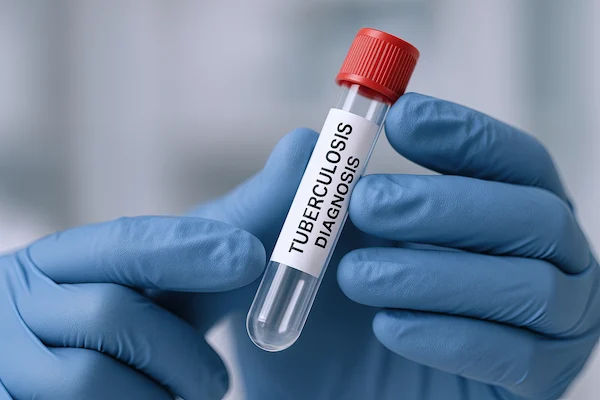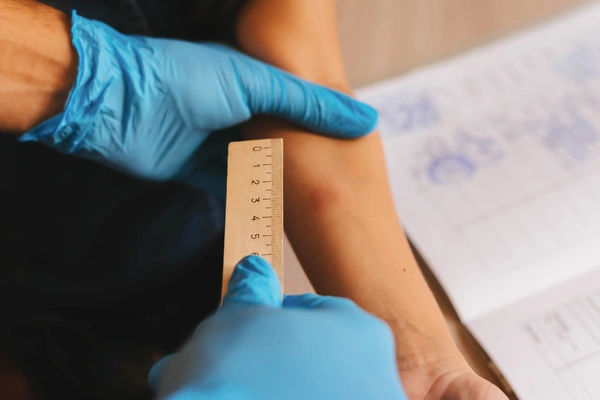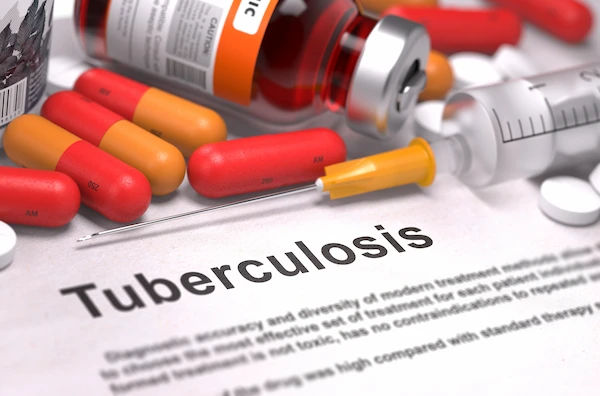Tuberculin Test Procedure and Results
Know about the tuberculin test procedure, why it is done, the test procedure, how to perform the test and the interpretation of the test result.


Introduction
Tuberculosis (TB) is a serious but treatable infection caused by the bacterium Mycobacterium tuberculosis. Early detection is crucial to prevent its spread and complications. One of the key tests used to check for TB exposure is the Tuberculin Skin Test (TST), also known as the Mantoux test.
If you or a loved one has been advised to take this test, you may have questions about how it works, what to expect, and what the results mean. This article will guide you through the entire process in simple terms.
What Is a Tuberculin Test?
The Tuberculin Test is a skin test that helps determine if a person has been exposed to TB bacteria. It does not confirm an active TB infection but indicates whether the immune system has reacted to the bacteria at some point.
Consult a Pulmonologist for Personalised Advice
Why Is It Done?
- To screen people at high risk of TB (e.g., healthcare workers, close contacts of TB patients).
- To check for latent TB (an inactive form that could become active later).
- Before starting certain treatments (like immunosuppressive drugs), which could reactivate TB.
How Is the Test Performed?
The procedure is simple and quick, performed in a clinic or doctor’s office. Here’s what happens:
Step 1: Cleaning the Skin
- A healthcare provider will clean a small area on your forearm with alcohol.
Step 2: Injection
- A tiny amount of purified protein derivative (PPD)—a harmless TB protein—is injected just under the skin using a small needle.
- You may feel a slight pinch, but it’s not painful.
Step 3: Waiting Period
- You must return 48–72 hours later (2–3 days) to have the injection site checked for a reaction.
- Do not scratch or cover the area with bandages, as this can affect results.
Understanding Your Results
After 2–3 days, a doctor or nurse will measure the swelling (induration, redness) at the injection site.
What Do the Results Mean?
False Positives/Negatives:
- False Positive: Previous BCG vaccine (given in some countries) or exposure to similar bacteria.
- False Negative: Weak immune system (HIV, malnutrition, recent infections).
If your test is positive, your doctor may recommend further tests (chest X-ray, sputum test) to check for active TB.
Get Your Health Assessed
What If the Test Is Positive?
A positive result means you have been exposed to TB bacteria, but it doesn’t always mean you have an active infection.
Next Steps:
- Chest X-ray: To check for lung abnormalities.
- Sputum Test: If active TB is suspected, a mucus sample is tested.
- Treatment for Latent TB: If no active infection is found, you may be given preventive medication to stop TB from becoming active later.
Tips for Managing TB Exposure
If you have latent or active TB, follow these steps to stay healthy:
- Take Medications as Prescribed – Skipping doses can lead to drug-resistant TB. Maintain Good Hygiene – Cover your mouth when coughing/sneezing.
- Eat a Balanced Diet – Strengthen your immune system with fruits, vegetables, and proteins.
- Avoid Smoking & Alcohol – These weaken your lungs and immunity.
- Regular Follow-ups – Ensure the infection is under control.
When to Consult a Doctor?
Seek medical advice if:
- You’ve been in close contact with a TB patient.
- You have symptoms like prolonged cough, fever, night sweats, or weight loss.
- Your tuberculin test shows a positive reaction.
Early detection and treatment can prevent serious complications.
Final Thoughts
The Tuberculin Test is a simple and effective way to check for TB exposure. While a positive result can be concerning, remember that TB is treatable. If you’re at risk or have symptoms, getting tested is the best way to protect yourself and others.
Consult a Pulmonologist for Personalised Advice
Consult a Pulmonologist for Personalised Advice

Dr. Hyder
Pulmonology Respiratory Medicine Specialist
5 Years • MBBS, MD (PULMONOLOGY)
Guntur
Kalam chest and multi-speciality clinic, Guntur

Dr. Tikly Das
Pulmonology Respiratory Medicine Specialist
7 Years • MBBS, Diploma in Tuberculosis and Chest Diseases
New Town
Dr Tikly Das' Clinic, New Town

Dr. Deepanshu Chawla
Pulmonology Respiratory Medicine Specialist
3 Years • MBBS, MD Respiratory Medicine
New Delhi
CHAWLA CLINIC, New Delhi
Dr. Lokesh Kumar Garg
Pulmonology Respiratory Medicine Specialist
15 Years • MBBS,DTCD,PGDS
Faridabad
Arsh Hospital, Faridabad

Dr. Mohammed Abdul Naseer
Pulmonology Respiratory Medicine Specialist
7 Years • MBBS, DNB Respiratory Medicine
Mahaboobnagar
Amrutha Hospatial, Mahaboobnagar
Consult a Pulmonologist for Personalised Advice

Dr. Hyder
Pulmonology Respiratory Medicine Specialist
5 Years • MBBS, MD (PULMONOLOGY)
Guntur
Kalam chest and multi-speciality clinic, Guntur

Dr. Tikly Das
Pulmonology Respiratory Medicine Specialist
7 Years • MBBS, Diploma in Tuberculosis and Chest Diseases
New Town
Dr Tikly Das' Clinic, New Town

Dr. Deepanshu Chawla
Pulmonology Respiratory Medicine Specialist
3 Years • MBBS, MD Respiratory Medicine
New Delhi
CHAWLA CLINIC, New Delhi
Dr. Lokesh Kumar Garg
Pulmonology Respiratory Medicine Specialist
15 Years • MBBS,DTCD,PGDS
Faridabad
Arsh Hospital, Faridabad

Dr. Mohammed Abdul Naseer
Pulmonology Respiratory Medicine Specialist
7 Years • MBBS, DNB Respiratory Medicine
Mahaboobnagar
Amrutha Hospatial, Mahaboobnagar
Get Your Health Assessed
₹3200(₹8000)60% off


.webp)


.webp)